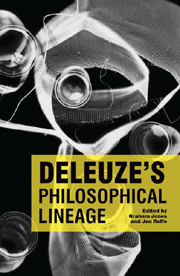Book contents
- Frontmatter
- Contents
- Acknowledgements
- List of Abbreviations
- Introduction: Into the Labyrinth
- 1 Plato
- 2 John Duns Scotus
- 3 G. W. F. Leibniz
- 4 David Hume
- 5 Immanuel Kant
- 6 Solomon Maimon
- 7 G. W. F. Hegel
- 8 Karl Marx
- 9 Hoëne Wronski and Francis Warrain
- 10 Bernhard Riemann
- 11 Gabriel Tarde
- 12 Sigmund Freud
- 13 Henri Bergson
- 14 Edmund Husserl
- 15 A. N. Whitehead
- 16 Raymond Ruyer
- 17 Martin Heidegger
- 18 Pierre Klossowski
- 19 Albert Lautman
- 20 Gilbert Simondon
- Bibliography
- Notes on Contributors
- Index
17 - Martin Heidegger
Published online by Cambridge University Press: 12 September 2012
- Frontmatter
- Contents
- Acknowledgements
- List of Abbreviations
- Introduction: Into the Labyrinth
- 1 Plato
- 2 John Duns Scotus
- 3 G. W. F. Leibniz
- 4 David Hume
- 5 Immanuel Kant
- 6 Solomon Maimon
- 7 G. W. F. Hegel
- 8 Karl Marx
- 9 Hoëne Wronski and Francis Warrain
- 10 Bernhard Riemann
- 11 Gabriel Tarde
- 12 Sigmund Freud
- 13 Henri Bergson
- 14 Edmund Husserl
- 15 A. N. Whitehead
- 16 Raymond Ruyer
- 17 Martin Heidegger
- 18 Pierre Klossowski
- 19 Albert Lautman
- 20 Gilbert Simondon
- Bibliography
- Notes on Contributors
- Index
Summary
In Deleuze's writings one finds frequent acknowledgements of the importance of Heidegger's rejection of the old image of thought and the significance of his new beginning. ‘The Heidegger question’, he wrote, ‘did not seem to me to be “Is he a bit of a Nazi?” (obviously, obviously) but “What was his role in this new injection of history of philosophy?”’ (D 12). Although there is more wholehearted acknowledgement in his early works and more nuances and qualifications later on, their generosity cannot be disputed. Deleuze's references to Heidegger reveal interesting points of proximity but also significant lines of divergence between the two philosophers. They praise Heidegger for his role in the transformation of the old image of thought (DR xvi–xvii); for the priority he assigns to questions and problems over answers and solutions (DR 200–1); for his refusal to follow the old philosophical line that considers thinking a natural endowment of human beings (DR 144, 275; F 116); for standing up with Duns Scotus for the univocity of Being (DR 35); for having contrasted memory with the forgetting of forgetting that makes of forgetting the impossibility to return and discovers in memory the necessity of renewal (F 107-8); for having displaced intentionality through the fold (F 111-13; N 112); for causing language to stutter in an etymological procedure that borders on madness (N 107); and for having assigned to difference the prominent philosophical role that distinguishes it from the negative, the identical and the equal, unhinges it from the modalities of representation and lets it be thought in association with the question and the fold (DR 64-5).
- Type
- Chapter
- Information
- Deleuze's Philosophical Lineage , pp. 321 - 338Publisher: Edinburgh University PressPrint publication year: 2009



